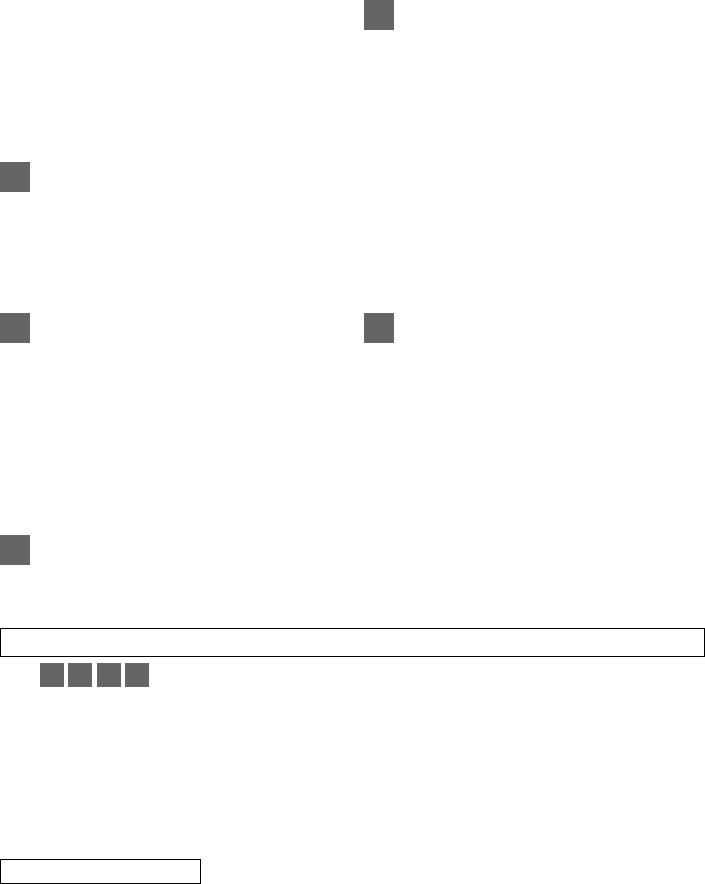
4 - ENGLISH
obstacles. Use the machine holding it to the right
of your body so that the exhaust fumes can
escape freely without obstruction from your
clothing. While working, grip the brush cutter
firmly with both hands. Stand in a stable position
on your feet. Keep the grips clean and dry. Do
not use the brush cutter while standing on a
ladder or other unstable support. You should
always be able to control your balance. Never
use the machine under extreme weather
conditions or in bad weather (very low
temperatures, very hot, humid climate, fog, rain,
wind, etc.). Keep all parts of your body and
clothing away from the blades during startup or
when the engine is running. During use, keep the
work zone in front of you. Never cut walking
backwards as you cannot see possible hazards.
Do not put the machine down with the engine
running. Never leave the machine alone. Never
raise the brush cutter above knee level during
cutting.
Before starting to work, put on the
supporting device as shown in “Backpack
adjustment”. Adjust the shaft fastening buckle so
that the blade or line cutter head are parallel to
the ground. The connection point (fig. A no.10)
should be held in the original position so as to
avoid unbalancing the shaft.
Precautions for carrying the machine
Never carry the brush cutter, even for short
distances, with the engine running. Switch
off the engine and carry it with the blade or nylon
string head facing backward. For your safety,
during transport and storage, always protect the
blade with the guard supplied with the machine
(see “Protection for transport”). When you
transport the brush cutter in a motor vehicle,
place it in a stable fixed position so that no fuel
leaks out. We recommend emptying the fuel tank
whenever you transport the machine.
Fire prevention precautions
Never work with the brush cutter in the
presence of fire or spilled gasoline. Do not
place any inflammable material in the pocket of
the backpack. If you have spilt it on yourself,
change your clothes at once. Keep the machine
clean by removing any grass cuttings, leaves,
excess oil to reduce the fire hazard. Engine
exhaust fumes can get very hot and may contain
sparks. Do not use the machine near
inflammable material. The muffler gets very hot
during use and remains hot for some time after
switching off the engine. This also applies at idle
speed. Take every precaution to reduce the fire
hazard, especially in the presence of
inflammable materials or gas. Start the engine at
a distance from the filling site and far away from
any fuel tanks (at least 3 meters).
When filling the fuel tank, dry any spilled
fuel. Never add fuel in the tank when the
engine is running or hot to avoid the risk of fire
(let the engine cool off before filling the tank). Fill
the tank outdoor, far from flames or sparks. Do
not take the cap off the tank with the engine
running. Open the cap on the tank carefully to
eliminate any excess pressure. After fueling,
close the cap tightly. Take care not to spill any
fuel. The fumes produced by the fuel can cause
an explosion or fire. Gasoline is highly
inflammable: before going near any type of fuel,
put out your cigarette, pipe or cigar. Do not
smoke or take sources of heat or sparks near the
fuel. Never refuel near or over inflammable
objects (dry leaves, etc..).
Kickback
Machines equipped with blades may
produce a violent kickback on contact with
solid bodies. The force of the kickback can cause
the operator to lose control of the machine. The
blade is capable of amputating arms and legs.
Always work with a sharp blade. A blade with
worn teeth can create problems in cutting and
can cause KICKBACK, that is, a violent thrust on
the front of the machine caused by the impact of
the blade against wood or solid foreign bodies.
This kickback can cause loss of control of the
machine. Never sharpen a damaged blade:
replace with a new one. Kickback can also occur
when cutting with any type of blade in the
hazardous zone (see I1). Do not let the blade cut
in the risk sector to prevent kickback.
ƽ
Safety lever
This device serves to prevent accidentally
pressing the throttle trigger (fig. A no. 3). In fact,
the trigger (fig. A no. 3), can only be pressed if
the safety lever is pressed at the same time
(fig. A no. 17). By means of 2 separate springs,
upon releasing the grip, the throttle trigger (fig. A
no. 3) and safety lever (fig. A no. 17) return
automatically to their original positions.
12
13
14
15
16
C. Description of the safety devices on the machine
ƽ
Never use the machine with its Safety
lever pressed with adhesive tape, string
or other.
1 2 3 4















